DOHA FORUM 2022 : Transforming for a New Era
Top Diplomats, Experts and Changemakers gather at Doha Forum to explore Transforming for a New Era
Doha Forum 2022, one of the world’s premier policy gatherings

Doha Forum 2022, one of the world’s premier policy gatherings, held under the patronage of His Highness Sheikh Tamim bin Hamad Al Thani, Amir of Qatar, reconvened today for its 20th edition at the Sheraton Hotel, Doha, bringing together policymakers, world leaders, and experts from around the world under the theme ‘Transforming for a New Era’.
This year’s edition of the two-day policy forum welcomes more than 200 speakers to debate some of the world’s most challenging issues, particularly the forum’s key theme of ‘Transforming for a New Era’, with a focus on four key areas; Geopolitical Alliances and International Relations, Financial System and Economic Development, Defense, Cyber and Food Security and finally Climate Change and Sustainability.
During the opening session, following the official opening by His Highness Sheikh Tamim bin Hamad Al Thani, the President of Ukraine, Volodymyr Zelenskyy received a warm welcome as he addressed the Doha Forum audience virtually, while Roya Mahboob, founder of the Digital Citizens Fund, received the Doha Forum Award 2022, which celebrates the achievements of an individual or organization based on the values of Doha Forum.
This year’s honourable guests include: H.E. Dr. Vjosa Osmani, President of Kosovo, H.E. Salem Al Meslet President of the National Coalition for Syrian Revolutionary and Opposition Forces, H.E. Mohammad Shtayyeh, Prime Minister, Palestine, H.E. Choguel Kokalla Maïga, Prime Minister, Mali, H.E. Mukhtar Tileuberdi Deputy Prime Minister and Minister of Foreign Affairs, Kazakhstan, with ministers and top diplomats from Qatar, Saudi Arabia, Iran, Ukraine, Singapore, Turkey, Bangladesh, Poland, Cote D’Ivoire, Afghanistan, Italy, Algeria, European Union, North Macedonia, Maldives, Jordan, Iraq, Mexico, Germany, Malaysia, Indonesia, Libya, Nigeria, Syria, Bosnia and Herzegovina, Sweden, Pakistan, Rwanda, New Zealand, the United States and United Kingdom.
Other notable guests include H.E. Sheikha Al Mayassa Bint Hamad Bin Khalifa Al Thani Chairperson, Qatar Museums, H.E. John Kerry, US Special Presidential Envoy for Climate, H.E. Filippo Grandi High Commissioner, United Nations High Commissioner for Refugees, H.E. BØRGE Brende, President, World Economic Forum, H.E. Mary Robinson Chair, The Elders, H.E. Abdulla Shahid, President, United Nations General Assembly, Patrick Turner, Assistant Secretary General For Defense Policy And Planning, NATO, Bill Gates, co-founder of Microsoft, co-chairperson of the Bill & Melinda Gates Foundation, Malala Yousafzai, activist and Nobel Laureate.
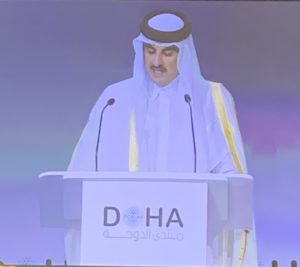
Doha Forum 2022 opened with a welcome address by His Highness Sheikh Tamim bin Hamad Al Thani, Amir of the State of Qatar, who spoke of the need for cooperation amongst the global community to more effectively address the issues of the day, saying “it is incumbent on all of us to determine the future of the international order and ask: what is the shape of the world we want for our children?”
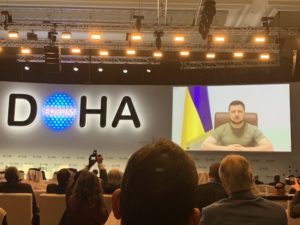
Ukrainian President Volodymyr Zelensky dialled into the opening session, echoing the call for unity, “We have to protect the international order, not just for Ukraine, but for Afghanistan, Syria, Yemen…”
Maldives Foreign Minister Abdulla Shahid spoke too of “a time of fragility, when our world faces multiple armed conflicts, nuclear proliferation, and the widening impacts of climate change.
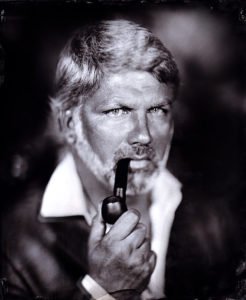
David DUBOIS
Directeur du Journal Général de l’Europe
The opening plenary session of Doha Forum was held under the running theme of this year’s edition, ‘Transforming for a New Era.’

The session focused on ways in which the world could address the shocks to the global economy and global order, with key speakers such as

HE Sheikh Mohammed bin Abdulrahman Al-Thani, Deputy Prime Minister of Qatar, Minister of Foreign Affairs stressing the need for cooperation and collaboration “we cannot be isolated from what is happening around us in the world. Qatar has been building a track record in dialogue and diplomacy.”
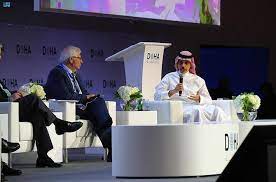
His Highness Prince Faisal bin Farhan Al Saud, Foreign Minister, Saudi Arabia followed, stating the importance of involving the global north and south, “particularly smaller and middle powers in addressing the needs of all rather than the needs of a few to work together in setting the global agenda.”
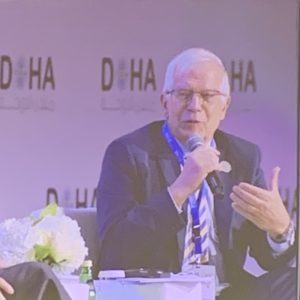
The High Representative/Vice-President Josep Borrell focused on the damaging consequences of Russia’s aggression against Ukraine for global security, the international rules-based system and the world economy. “War against Ukraine is not only a European or Western issue. It endangers the whole world, because it tries to endorse the approach “the might is right,” he said.
Misinformation and the War for Truth (Foreign Policy)
In this discussion, panellists explored how mis- and disinformation spread across social media, promoting the dissemination of conspiracy theories and fringe political beliefs.
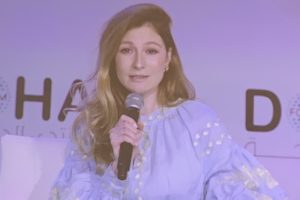
H.E. Emine Dzhaparova, First Deputy Minister for Foreign Affairs, Ukraine, spoke of Russia’s recent invasion of Ukraine and the media frenzy surrounding it, including Russian propaganda, stating: “There is an invisible information war front. The effort of this is greater than we think it is. It’s like radiation. You don’t see it, but it affects your mental health and greater health.”
The panel also discussed the current state of global mis- and disinformation efforts around the world and how stakeholders and tech companies can most effectively combat them.
“Historically, a number of the biggest players in tech prefer to see themselves as operating on the side of the people,”said Elizabeth Joanna Linder, Founder, Brooch Associates. She continued: “While that is such an incredible philosophy, it is totally impractical and does not map to how the real world works. In the long term, there needs to be a check in balance, between tech companies and government.”
Building a New Sustainability Paradigm: Cities Contribution to the Climate Solution (QF)
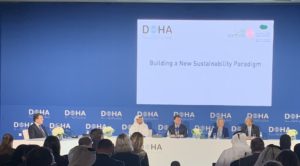
In the session, Building a New Sustainability Paradigm: Cities Contribution to the Climate Solution, speakers explored ways of enhancing the resilience of cities by incorporating nature into their design.
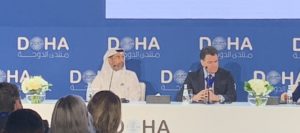
Moderator Gonzalo Castro de la Mata, Executive Director, Earthna Center for a Sustainable Future, noted that cities consume 70% of the world’s energy and are responsible for three quarters of global emissions, despite them only taking up 2% of the earth’s surface.
“It is increasingly understood that nature is a friend to cities looking for resilience,” commented Jane Madgwick, President and CEO of Wetlands International. “In some cities it is essential to restore nature because the impact [of climate change] is too severe. It’s about linking socio-economic development with environmental development.”
H.E. Manuel Pulgar-Vidal, Global Leader of Climate & Energy at the World Wildlife Fund; Former Minister of Environment of Peru and Former President of COP20, stressed the importance of rewarding progress rather than success to ensure that less-developed cities do not become discouraged from making changes. “We have to move to net-zero by 2050 and that requires raising our ambition in the current decade,” he added.
H.E. Sheikh Faleh bin Nasser bin Ahmed bin Ali Al Thani, Minister of Environment and Climate Change, Qatar, highlighted the significant role Qatar is playing in reducing gas emissions through carbon capture technology. “We have committed to reducing carbon emissions by 25% by 2030, and to do that we are expanding the capacity of our carbon capture facility from 2 million tons to 9 million tons by 2030. We will also start operating Qatar’s first solar power plant this year using photo-voltaic technology.”
The session featured the launch of Earthna Center for a Sustainable Future, a non-profit research and advocacy center. Earthna, a member of Qatar Foundation, will channel the organisation’s education, research, and innovation ecosystem into generating solutions that enhance Qatar’s global sustainability policy role where the country has unique insight and capabilities.
Economies of War (ICG)
This panel furthered a discussion of the political and military dimensions of war, with an assessment of how the control of resources, as well as other financial and economic considerations, shifts the calculus of peace amongst warring parties.
The economic dimension of conflict cannot be entirely separated from resolution mechanisms. Speaking of Yemen, where the internationally recognized government and Houthi rebels have exacerbated the world’s worst humanitarian crisis as they are locked in a tug-of-war over imports and finance,
HE Hans Grundberg, Special Envoy of the Secretary-General for Yemen, articulated how “the challenge in Yemen is the disintegration of state bearing institutions. Until 2018 the warring sides respected the impartiality of economic institutions, but as the war dragged on it weaponized the economic dimension. This needs to be addressed if you want to depoliticize the economic component of the conflict.”
HE Raychelle Omamo Foreign Minister, Kenya elaborated on the need for African countries to unify and become self-sufficient, whilst calling for the “need to partner on development, health, job creation, digitization – things that help our people stand.”
Reimagining Business Models in a Post-Pandemic Era (QIA)
In the session, Reimagining Business Models in a Post-Pandemic Era, experts talked about the dramatic transformations ushered in by the pandemic in sectors such as technology and retail, as well as the accelerated innovation across many industries.
Mr. Jaydeep Barman, CEO, Rebel Foods, predicted changing dining patterns, commenting, “Real estate has gotten costlier, while technology has gotten cheaper. Using the same kitchen to create an internet restaurant is a change that will launch new brands, which is a very exciting opportunity going forward.”
Ms. Hande Çilingir, Co-Founder & CEO, 1X Entrepreneur, opined that the pandemic had changed business drastically: “Customers and brands changed how they are interacting with each other and the client. Artificial intelligence and machine learning are helping brands learn customer preference and priorities. And, we are using big data and AI to identify more than sixty parameters in algorithms to make smarter decisions and predictions for the consumers.”
Mohammad Saif Al Sowaidi, Chief Investment Officer, Americas, Qatar Investment Authority stressed the role of investment in driving innovation “Capital and partnerships are only there to help and guide entrepreneurs. The role we would like to play is to utilise our ability to support entrepreneurs because the journey is not always easy. We invested in businesses when they are a concept and create a new format for their model.”
The International Community’s Role in Managing Refugee Flows: Syria and Beyond (Antalya Diplomacy Forum)
This discussion addressed managing refugee flows, particularly how to ease the burden borne by developing countries, when it comes to housing, feeding, and protecting these vulnerable populations.
HE Salem Al Meslet, President of the National Coalition for Syrian Revolutionary and Opposition Forces, spoke of how “60% of the Syrian population have left their homes and country. The cause of this is an aggression happening in Syria and Ukraine, coming from the same aggressor.”
H.E. Benedetto Della Vedova, Undersecretary of State at the Ministry of Foreign Affairs, Italy,stressed the importance of changing the policies with refugees. He stated that EU countries are now accepting a one year visa for Ukranians to live in their country until the crisis is over. He said: “It has been possible for us to give Ukrainans a one year visa because of political reasons. I regret that it wasn’t possible before with the Syrian refugees. It wasn’t possible to find an agreement between the states in the EU. It was not possible for political reasons.”
On allowing more Syrian refugees into the EU, H.E. Benedetto Della Vedova said: “We need to work on a partnership with the countries of the region and set up some schemes to let people go to Europe and look for a job legally.”
H.E. Joanna Wronecka, Special Coordinator for Lebanon to the United Nations focused on supporting refugees in Lebanon, a country with minimal resources that is, according to UNHCR, host to 840,000 Syrian refugees.
Dr. Savaş Ünlü, Director General of Migration Management of the Ministry of Interior, Turkey, spoke to the need to reconfigure the system, addressing the socio-economic concerns that fuel conflict and drive individuals from their countries.
The Promises and Perils of Artificial Intelligence & Analytics for Decision-making (RAND)
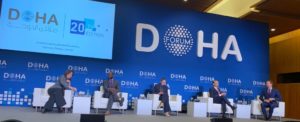
In “The Promises and Perils of Artificial Intelligence & Analytics for Decision-making” data, anthropology and business experts imagined what a data-driven future would look like for humans.Addressing the dystopian image many have of robots taking over the world,
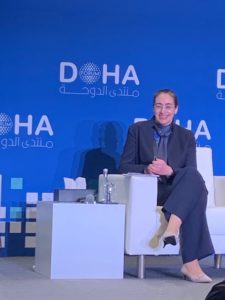
Dr. Danielle Tarraf, Senior Director, JCI Ventures remarked, “There is validity in fear but what we have been seeing is AI augmenting people rather than replacing them. We’re seeing AI doing things that tire or bore people, or things that people couldn’t do such as all-night monitoring and surveillance.”
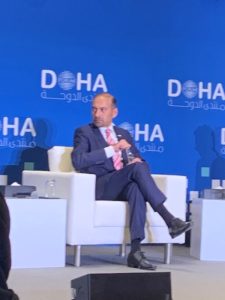
Dilawar Syed, Special Representative for Commercial and Business Affairs, US State Department, cautioned “We know from social media companies that the track record is not great when it comes to companies regulating the ill-effects [of technology]. We are going into a world that is going to fundamentally change how we do everything. We cannot be driven by fear, but we cannot leave it to companies to self-regulate.”
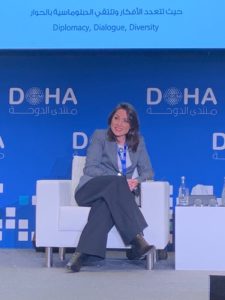
Dr. Kathryn Bouskill, Researcher at Meta, expressed her optimism for the future of AI in health: “The last time I was at the Doha Forum in 2019 I was talking about global health security and the risk for a pandemic. So I am particularly excited to see how we can bring AI into epidemiology. At the same time, I believe AI can face shortcomings if we don’t build systems that can adjust to the benefits AI can bring.”
Qatar Foundation announces the launch of Earthna Center
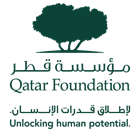
Center to address sustainability policy in the critical areas of arid climates, sustainable cities and communities
Qatar Foundation has announced the launch of its Earthna Center for a Sustainable Future, a non-profit policy center, at the annual Doha Forum summit.
Building on a legacy of many years of work by Qatar Foundation (QF) in the field of sustainability, the new center will channel QF’s education, research, and innovation ecosystem into generating solutions that enhance Qatar’s global sustainability policy role where the country has unique insight and capabilities.
Dedicated to thought leadership in policymaking, establishing and promoting policy priorities, strengthening linkages between education, research, and industry, and extending Qatar Foundation’s network of domestic and international collaboration, Earthna will focus on sustainability in hot and arid climates, sustainable energy, and maximizing QF’s Education City campus as a test bed for new technologies and sustainable implementations.
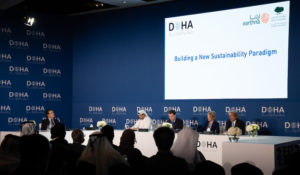
The launch of Earthna at the high-level panel discussion explored ways of making cities the focus for sustainable global solutions for nature and climate. Expert panelists who gave their insights in the panel discussion were His Excellency Sheikh Dr. Faleh bin Nasser bin Ahmed bin Ali Al Thani, Minister of Environment and Climate Change, Qatar; The Right Honorable Vincent Thomas Keaveny, Lord Mayor of London; Jane Madgwick, CEO, Wetlands International; Manuel Pulgar-Vidal, Leader of Climate and Energy Global Practice – at WWF; and Gonzalo Castro de la Mata, Executive Director of Earthna.
“Our connection to nature holds the key to our future. As a leader in sustainability, QF has supported nationwide priorities, from educating our community about sustainability to generating solutions for Qatar’s most pressing environmental challenges. By creating Earthna, we are bridging our research and community strengths to address new policy solutions” said Her Excellency Sheikha Hind bint Hamad Al Thani, Vice Chairperson and CEO of Qatar Foundation.
Earthna will convene a wide community of experts, government, policy and decision makers, businesses, multilateral institutions, and civil society to generate a more sustainable future. It will also incorporate and build on key elements of the work in cultivating sustainable behaviors, mindsets, and action that have been driven by QF entities.
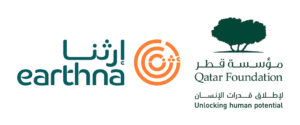
“Earthna is focused on developing tools, solutions, and policies to improve people’s lives within a thriving natural environment,” said Mr. de la Mata.
“Qatar sits at the heart of global challenges, which gives us an incredible opportunity to lead global dialogue and promote sustainable policy. Earthna will bring together local and global experts to design and advocate for solutions with global impact.”
The Earthna center will focus on the areas of circular economy, sustainable energy, resource security and management, environmental protection and restoration, and societal wellbeing.
To find out more about Earthna, visit www.earthna.qa
Qatar Foundation – Unlocking Human Potential
Qatar Foundation for Education, Science and Community Development (QF) is a non-profit organization that supports Qatar on its journey to becoming a diversified and sustainable economy. QF strives to serve the people of Qatar and beyond by providing specialized programs across its innovation-focused ecosystem of education, research and development, and community development.
QF was founded in 1995 by His Highness Sheikh Hamad bin Khalifa Al Thani, the Father Amir, and Her Highness Sheikha Moza bint Nasser, who shared the vision to provide Qatar with quality education. Today, QF’s world-class education system offers lifelong learning opportunities to community members as young as six months through to doctoral level, enabling graduates to thrive in a global environment and contribute to the nation’s development.
QF is also creating a multidisciplinary innovation hub in Qatar, where homegrown researchers are working to address local and global challenges. By promoting a culture of lifelong learning and fostering social engagement through programs that embody Qatari culture, QF is committed to empowering the local community and contributing to a better world for all.
For a complete list of QF’s initiatives and projects, please visit: www.qf.org.qa
To stay up to date on our social media activities, follow our accounts on: Instagram, Facebook, Twitter and LinkedIn.
Earthna Center for a Sustainable Future
Earthna is a non-profit policy center established under Qatar Foundation (QF) to inform and influence national and global sustainability policy.
Bridging technical and research expertise with policy advice and advocacy, Earthna will convene a wide community of technical and research experts, government, policy and decision makers, businesses, multilateral institutions, and civil society to generate a more sustainable future.
The Earthna center runs multidisciplinary programming with a focus on the fields of hot and arid climates, sustainable cities, and sustainable energy, as well as the potential of QF’s Education City as a test-bed for sustainable technologies and practices.
Earthna is focused on developing tools, solutions, and policies to improve people’s lives within a thriving natural environment. Working together with our community to co-create and design solutions that utilize our resources limits and understand our local culture and needs, we deliver a message of hope and impactful action that will strengthen our legacy.
Prospects for Women and Girls in Afghanistan (Doha Debates)
In the “Prospects for Women and Girls in Afghanistan”, humanitarian, political, and religious advocates shared their vision of what Afghanistan could look like in the future. Outlining a strategic approach to the Afghan caretaker government’s ban on education for girls.
The Former Member of the Islamic Republic of Afghanistan Negotiation Team and Afghanistan Red Crescent Society, Fatima Gailani commented: “We must not play with this situation, we cannot be emotional about it. This is the future of 16 million women in Afghanistan. Afghan women know exactly what they want, which is equal right of education, equal right of work, and equal right of participation”.
Deconstructing the religious crux of the educational ban, Dr. Omar Suleiman, Founder and President of Yaqeen Institute for Islamic Research, stated: “Religious scholarship should insist on proper interpretation of Islamic text and holistic solutions to these problems and not politicize education, economic aid, and food and drink, and bring forward how religion can be part of the solution”.
Highlighting her efforts to bring humanitarian aid to Afghanistan, the Nobel Prize Laureate and Activist, Malala Yousafzai, underscored that education is integral to bringing hope and progress to the people of Afghanistan. “What is really needed right now is a strong statement from Muslim countries that defend girls’ rights to education in the Islamic context. Seeking education is the duty of every Muslim. If we want to actually address these issues, we have to talk about human rights, through dedicated dialogues, and inclusivity in these dialogues”.
Energy Transition and Security: Meeting Demand in a Volatile World (Qatar Energy)
This dialogue centred around the global energy crisis and fuel shortages which led to blackouts, and rising electricity costs across Europe and Asia this past winter.
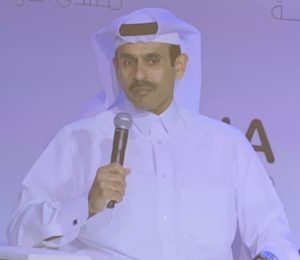
His Excellency Saad Sherida Al-Kaabi, the Minister of State for Energy Affairs, and President and CEO of QatarEnergy, compared the European and Asian energy markets, saying “during this situation with Ukraine, we are not going to divert away from Europe, although we have the contractual right to do that.”
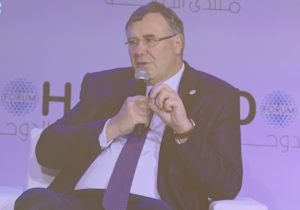
Patrick Pouyanné, Chairman and CEO TotalEnergies stated, ““Energy is a triangle: security of supply, pricing, and climate… We must find the right balance… Gas is part of this transition, because it gives the flexibility to move from coal to renewable to fully carbonised.”
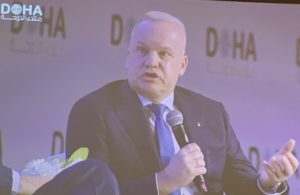
Russia’s ongoing invasion of Ukraine was also discussed, with Anders Opedal, President and CEO, Equinor, saying, “We are in a war situation, so now it is about finding some of the short term solutions to ensure people get the energy, and particularly, it is important to ensure that we are not moving from an energy crisis to a fuel crisis.”
The panelists also explored the question of what role producer nations play in ensuring the world has adequate and affordable supplies of fuel while countries work towards building the infrastructure needed for a transition to more renewable energy sources. They additionally explored how suppliers can work together to regulate prices and manage supply, while protecting their interests in a world increasingly committed to green energy.
Newsmaker Interview: His Excellency John Kerry, United States Special Presidential Envoy for Climate and Former Secretary of State
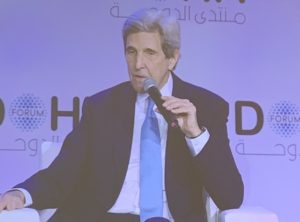
In this Newsmaker interview, John Kerry stressed the importance of taking action against the the climate crisis, stating: “The best scientists in the world – repeatedly – over 30 years – are telling us unequivocally, that we have X number of years, now down to 8, to make critical decisions and implement them to avoid the worst consequences of the climate crisis.”
Newsmaker Interview: Her Excellency Emine Dzhaparova, First Deputy Minister for Foreign Affairs, Ukraine

In a Newsmaker interview with CNN’s Becky Anderson, HE Emine Dzhaparova called on Western powers to take action to halt Russian aggression, stating: “Territorial integrity is the very basis of international law. When the war started, everyone thought that Ukrainians would give up, but this did not happen. We have over 100,000 Ukrainian men who want to join this territorial defense. People are not ready to give up”.
The Global Displacement Crisis: Beyond Humanitarianism (Wilson Center)
This panel addressed the international responsibility towards refugees. The more than 80 million forcibly displaced people worldwide often seek refuge in nearby towns or countries which have scant resources.
HE Ayman Al Safadi, Minister of Foreign Affairs, Jordan, spoke of the need to provide individuals with the ability to live in dignity, through the creation of opportunity and a return to normalcy. “Give them hope, give them respect. Without this, there is a greater risk for radicalism which affects everyone.”
The panel shed light on the breadth and depth of the displacement crisis and the importance of focussing efforts beyond aid, towards development assistance.
HE Filippo Grandi, High Commissioner, United Nations High Commissioner for Refugees stated: “In the emergency phase [aid] is not complicated we must start thinking about the medium and long term at the very start of an emergency” which necessitates considering solutions to reduce the need for migration or to facilitate a return to their countries of origin.
The panellists further spoke of the importance of funding rather than goods when helping refugees, of particular importance as situations become protracted and the large-scale resources available during the emergency phase of a crisis drying up. To sustainably address the humanitarian crises, panellists spoke of the importance of connecting with development organisations from early on, to obtain buy-in and longer term solutions.
FIFA Foundation announces partnerships with Generation Amazing and Qatar Foundation to support FIFA WORLD CUP QATAR 2022™ Legacy

Two Memorandums of Understanding signed during ceremony at Doha Forum in Qatar
FIFA Foundation is teaming up with Qatar Foundation and Generation Amazing to deliver a range of football initiatives to empower youth and the community of Qatar that go beyond the FIFA World Cup Qatar 2022™.
The announcements came during the Doha Forum, where FIFA Foundation signed agreements with Qatar Foundation (QF) and Generation Amazing (GA), a human and social legacy project of the Supreme Committee for Delivery & Legacy (SC).
As part of the agreements, the entities are working together on rolling out the Football for Schools (F4S) program in Qatar. The initiative, run by FIFA in collaboration with UNESCO, aims to contribute to the education, development, and empowerment of around 700 million children globally, and seeks to make the sport more accessible to both boys and girls around the world by incorporating football activities into the education system.
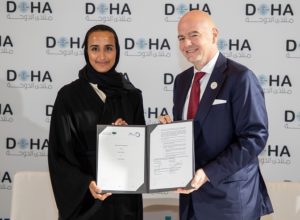
Speaking after the signings, FIFA President Gianni Infantino said: “It is with great pleasure that today the FIFA Foundation officially partners with Generation Amazing and Qatar Foundation.
“To be able to positively impact society through the power of football is a shared goal and responsibility between each of our organizations, and using sport to reach the next generation is something all three place at the forefront of everything they do. We look forward to working together over the coming months and years in many common projects, and particularly to deliver Football for Schools in Qatar.”
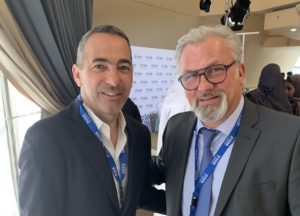
In addition to the MoU signings, FIFA Foundation, QF and GA also hosted a launch event at the Generation Amazing Community Club – a short distance from Lusail Stadium, the venue at which the FIFA World Cup Qatar 2022TM final will take place on 18 December 2022. Joining more than 80 schoolchildren from across Qatar to participate in the football and education activities were three FIFA World Cup™ stars – FIFA Foundation CEO Youri Djorkaeff, as well two FIFA Legends; Australia’s Tim Cahill and Netherlands’ Nigel de Jong.
The F4S program also utilizes a free digital application – accessible via Google Play and the Apple App Store – which includes various training modules, and is intended to help physical education teachers, coaches, and parents to better support and manage F4S activities in their schools and communities. QF and GA have contributed to the inclusivity and sustainability modules, with the inclusivity sections offering guidelines on how to promote accessibility within the program and the sustainability modules providing information on regenerative education.
Her Excellency Sheikha Hind bint Hamad Al Thani, Vice Chairperson and CEO of Qatar Foundation; His Excellency Hassan Al Thawadi, Secretary General of the Supreme Committee for Delivery & Legacy; and Gianni Infantino, FIFA President, attended the ceremonies and signed the agreements.
Her Excellency Sheikha Hind said: “Hosting the FIFA World Cup Qatar 2022™ is a momentous occasion for our nation, and for the region as a whole. Working alongside our partners, FIFA Foundation and Generation Amazing, we are harnessing the power of football to affect positive change among young people and promote social progress that stretches beyond the FIFA World Cup Qatar 2022™.
“At Qatar Foundation, education is at the core of our mission, our ecosystem, and our beliefs. As we work together with our partners to reach our shared goals, we will offer our unique insights, expertise, and knowledge on the topics of inclusivity and sustainability – both of which are values that drive our efforts.”
The newly signed partnership between FIFA Foundation and GA enables both parties to make collaborative efforts to work on the enhancement of football for development initiatives, aligned with the UN Sustainable Development Goals and jointly develop sport education initiatives to further build human capital and skills regionally and globally. The partnership provides a platform for the two organizations to work on the implementation of these initiatives with a shared vision of social inclusion and cohesion.
“We are very proud to present this strategic partnership with FIFA Foundation, which highlights our belief in the power of football as a truly global and transformative tool that advances sustainable development and provides youth with unique opportunities to better their lives,” said His Excellency Al Thawadi.
“As Qatar prepares to host the region’s first FIFA World Cup, we aim to utilize our partnership with FIFA Foundation to leave a meaningful human and social legacy in the region and beyond.”
The F4S program, which contributes to the United Nations’ Sustainable Development Goals, was launched in mid-2019 with pilot projects in Puerto Rico and Lebanon, and the Qatar Football Association and the Ministry of Education and Higher Education have been instrumental in launching the initiative in Qatar.
Qatar Foundation – Unlocking Human Potential
Qatar Foundation for Education, Science and Community Development (QF) is a non-profit organization that supports Qatar on its journey to becoming a diversified and sustainable economy. QF strives to serve the people of Qatar and beyond by providing specialized programs across its innovation-focused ecosystem of education, research and sciences, and community development.
QF was founded in 1995 by His Highness Sheikh Hamad bin Khalifa Al Thani, the Father Amir, and Her Highness Sheikha Moza bint Nasser, who shared the vision to provide Qatar with quality education. Today, QF’s world-class education system offers lifelong learning opportunities to community members as young as six months through to doctoral level, enabling graduates to thrive in a global environment and contribute to the nation’s development.
QF has also created a multidisciplinary innovation hub in Qatar, where homegrown researchers are working to address local and global challenges. By promoting a culture of lifelong learning and fostering social engagement through programs that embody Qatari culture, QF is committed to empowering the local community and contributing to a better world for all.
For information on QF initiatives and projects, please visit QF website: http://www.qf.org.qa
To stay up to date on our social media activities, follow our accounts on: Instagram, Facebook, Twitter and LinkedIn.
About Generation Amazing:
Generation Amazing (GA) is the human and social legacy programme initiated in 2010 during Qatar’s successful bid for the 2022 FIFA World Cup™. Our football for development programme has reached 725,000 direct and indirect beneficiaries to date. We are looking to expand this reach further to 1 million youth in 2022.
Aligned to the United Nation’s Sustainable Development Goals and 2030 Qatar National Vision, we see sports in general and football in particular as a transformative tool and as a fundamental instrument in order to achieve socio-economic and wider development outcomes for refugee communities and disadvantaged youth globally, including countering violent extremism through sport and protecting education from attack.
For more information visit www.generationamazing.qa or follow @GA4Good.
About FIFA Foundation
Established in March 2018, the FIFA Foundation was created as an independent entity with the objectives to help promote positive social change around the world and raise support for the recovery and reconstruction of damaged or destroyed sports infrastructure worldwide. The FIFA Foundation runs a number of programmesaround the world.
Building Stability in Libya (Wilton Park)
The panel Building Stability and Peace in Libya addressed Libya’s ongoing political vacuum since the 2011 uprisings which culminated in the removal of Colonel Muammar Gaddafi. The destabilising power struggle that followed the 2011 international intervention saw the emergence of armed militias that have since gained power along with the evolution of cogent political identities. The presence of foreign mercenaries remains a defining feature in the conflict. Libya’s next election, postponed from December 2021, is now expected this year and the importance of stabilisation in Libya is paramount.
Najlaa Al-Manqush: Minister of Foreign Affairs of the Libyan National Unity Government began the discussion and commented on the upcoming elections in Libya, stating, ‘We are very keen to have an election as soon as possible because I think this is the only solution for Libya.’ She continued, “We don’t want to jump to the result without paving the way towards a more sustainable election.”
Newsmaker Interview: H.E. Mevlüt Çavuşoğlu, Minister of Foreign Affairs, Turkey
In this interview, H.E. Mevlüt Çavuşoğlu, Minister of Foreign Affairs, Turkey spoke on a number of issues including the Russia-Ukraine conflict as well as Turkey’s economic performance in the last ten years: stating “the international community should continue pressuring the particular aggressor which is Russia. Aggression on Ukraine is unacceptable.”
newsmaker interview Dr. Sayyid Kamal Kharrazi, President, Strategic Council on Foreign Relations; Former Minister of Foreign Affairs, Islamic Republic of Iran
In a newsmaker interview with CNN’s Becky Anderson, Dr. Sayyid Kamal Kharrazi, President, Strategic Council on Foreign Relations; Former Minister of Foreign Affairs, Islamic Republic of Iran responded to questions about the Joint Comprehensive Plan of Action (JCPoA) and how the resumption of negotiations would help shape Iran’s economic landscape and alliances with Western countries.
Next Anderson interviewed Robert Malley, United States Special Representative for Iran, who mapped the steps the US has taken to further the JCPoA while addressing concerns for the US, Iran, and the Gulf region.
Spheres of Influence in the Age of Unpeace
This session discussed the shifting dynamics determining power and control in the modern era, particularly the conflict in Ukraine.
H.E. Børge Brende, President, World Economic Forum, spoke of the global response to Russia’s breach of Ukraine’s territorial integrity, in contravention of agreed upon norms, and the effect this has had within Europe in particular.
H.E. Ivan Korčok, Minister of Foreign and European Affairs, Slovak Republic agreed, stating that this showed how “Ukraine is definitely becoming part of the political West…a watershed moment.”
With an increasingly unified Western bloc, as represented by NATO, there remains a regional difference in terms of responses to this conflict.
H.E. Hina Rabbani Khar, Member of National Assembly, Pakistan spoke of how the Ukrainian conflict will “be felt not just regionally as has been the norm for most interventions, but also in the rest of the world,” continuing that non-Western powers have “seen Abu Ghraib, and Guantanamo and how these wars have been conducted… this has left a deep dent in the reputation of the West.”
Economic Crises and Coordinated Global Recovery Efforts: Towards An Inclusive Multilateralism
This session discussed the vulnerabilities of the global economic system – from supply chain disruptions to structural issues within existing institutional frameworks.
H.E. Ali bin Ahmed Al-Kuwari, Ministry of Finance and former Minister of Commerce and Industry said “International organisations like the IMF play a really important role, but they are not the only solution,” adding that “we still have instability [in the world] following the COVID-19 pandemic…the Ukrainian crisis.”
Kristalina Georgieva, Managing Director of the International Monetary Fund, also stressed the importance of stability as necessary to peace, saying “the root cause [of the current economic situation] is the war in Ukraine. The faster the tanks are out, the faster the tractors are in.”
Georgieva also highlighted the IMF’s role in protecting people, saying: “We calculated at the IMF that the pandemic cost the world economy 30.8 trillion dollars and billions to vaccinate people. So we spend trillions to protect billions.”
Addressing the Effects of Climate Change Today: Adaptation Policies for a Climate-Resilient Future
This session outlined the actions needed to help lower-income countries and farmers avoid climate disaster and adapt to changing conditions.
Bill Gates, Co-founder of Microsoft; Co-chairperson of the Bill & Melinda Gates Foundation, reinforced this, announcing Nanmo, a new partnership between the Bill & Melinda Gates Foundation and Qatar Fund for Development, that will support and deploy game-changing innovations.
H.E. Marcelo Ebrard, Secretary of Foreign Affairs of Mexico stressed the importance of implementing a mechanism across regions and countries, recommended each participating country contribute sum relative to their emissions.
H.E. Khalifa Jassim Al-Kuwari, Director General, Qatar Fund for Development, discussed the need for strong political commitment, international and regional policy, and technological mechanisms to tackle climate change through a holistic approach. He further reiterated the significance of Nanmo in reducing the inequalities faced by small-scale farmers in Sub-Saharan Africa, mainly through helping scale up productivity.
Mark Suzman, Chief Executive Officer, Bill & Melinda Gates Foundation, further highlighted the importance of policy and resource prioritization at the regional level, particularly ways to increase resource allocations, providing agricultural tools, and utilizing new digital soil mapping techniques.
Maja Groff, Convenor, Climate Governance Commission, reiterated that “mitigation and adaptation challenges are formidable challenges.” By scaling up and accelerating knowledge and technology transfers, countries can learn from each other and adopt innovative means of facilitating sustainable economic solutions for the future.
Geopolitical Implications of the Russia-Ukraine War on the Middle East
This session discussed Russia’s conflict with Ukraine and its impact on MENA and beyond.
Mr. Ibrahim Kalin, Chief Counsellor to the President of the Turkish Republic spoke on the need for mediation, saying “Russia will not go away, the western bloc will remain there and Ukraine will still be an independent country, but mediation efforts to end this war will be key in shaping this renewed security architecture.” He continued, “We have kept our lines of communications with Ukraine and Russia open, which is very good. Even though we have disagreed with Russia in Syria, we have managed to discuss our differences.”
Congresswoman Jane Harman, Distinguished Fellow and President Emerita, Wilson Center, lauded Qatar for the important role it is playing to help solve the energy crisis following the conflict between Russia and Ukraine, “My impression is that Qatar is trying to do what it can to meet this request, but the issue is all its [oil and gas] supplies are fully committed, with some heading to Europe and Asia.”
Dr. John Gong, Professor of Economics, University of International Business and Economics discussed China’s role in the crisis between Ukraine and Russia, and why his country has yet to apply sanctions on the Russians, explaining that “China shares a very long border with Russia, if we put sanctions on Russia we will have issues with them. Almost all countries that have put sanctions on Russia have some kind of nuclear protection, China does not.” He also stated that the United States has been promoting a narrative that all countries must put sanctions on Russia or else they will be considered strong supporters of the war.
Mohammad Hassan Sheikholeslami, Deputy Foreign Minister, Iran and President of the Institute for Political and International Studies (IPIS) stated: “Iran has started constructive negotiations with Qatar as well as with the UAE and we have also had discussions with Saudi Arabia. We were supposed to have the fifth round of negotiations with KSA but it did not happen due to the recent events which we are against and [find] unacceptable.”
Spokesperson for the Ministry of Foreign Affairs in Qatar Dr. Majid Al-Ansari stressed that his country is against the war between Ukraine and Russia, saying: “The position is crystal clear – we are against military escalation.” He continued: “It is our duty to facilitate the communication between small and medium power countries and large power countries.”
On the importance of creating a new world order which includes the United States and its allies, Al-Ansari said: “If the West expects the rest of the world to respect the international world order, then the West, the United States, and their allies really need to talk with the rest of the world. We are moving to a multipolar world. Let’s talk together about how to get there because if we don’t, we will see a world where everybody is dying.”
The Fourth Industrial Revolution: Challenges and Opportunities for a New Era
In this session, panellists discussed rapid advances in technology and how they are revolutionizing the way we live, work, play and engage.
Mohammed bin Ali Al Mannai, minister of Communications and Information in Qatar discussed utilising technology that already exists stating, “We should invest in equipping the existing resources to reach future needs.”
While previous industrial shifts (steam and water power, electricity and assembly lines, and computerization) have unfolded more gradually, the advancements of the Fourth Industrial Revolution are occurring at a faster pace, disrupting sectors and economies in almost every country.
Børge Brende, president of the World Economic Forum, commented on this phenomenon and added, “Covid helped a digital transformation, that would have happened over ten years, happen in two years.”
The panellists also discussed Africa’s journey in technological advancements and the importance it has on the future of Africa from an economic and educational standpoint.
Patrice Motsepe, founder and Executive Chairman, African Rainbow Minerals, South Africa, commented on the importance of inclusivity in technology, stating, “We want to encourage Africans to develop African technology,” adding, “Innovation does not have its source or origin anymore.”
Perilous Waters: Peace and Prosperity in the Indo-Pacific
In the “Perilous Waters: Peace and Prosperity in the Indo-Pacific”, Southeast Asian economic and political leaders delved into the importance of securing the stability of the region.
Emphasizing the significance of the Indo-Pacific region as a place of peace, neutrality, and freedom,
H.E Retno Marsudi, Minister of Foreign Affairs, Indonesia, commented: “ASEAN would like to achieve a mindset of dialogue and collaboration, which offers nurturing, strategy, and trust. Concrete ASEAN cooperation prioritizes issues of maritime, connectivity, attainment of SDGs, and the creation of an inclusive regional architecture”.
Building on the sentiment, YB Dato’ Kamarudin Jaffar, Deputy Minister of Foreign Affairs, Malaysia, also highlighted the need to protect the region’s role in global trade routes and stated: “ASEAN needs to be more consolidated and forceful in our disagreement when violations of our territorial integrity happen.”
Stressing the need for international support for the region’s prosperity, Lisa Curtis, Senior Fellow and Director, Indo-Pacific Security Program, reflected on the US’ contribution to the region’s development: “The US sees the region as vital, and it will work closely with its allies and partners for furthering stability and prosperity in the region. We need to work more closely with our allies in Asia to meet challenges and preserve its rules-based order.”
Vaccine Distribution: Collaborative Solutions for an Equitable System
This session revolved around global contributions to vaccine equity and efforts in tackling the unprecedented challenges posed by the COVID-19 pandemic.
Sultana Afdhal, CEO, World Innovation Summit for Health (WISH), initiated the discussion with an emphasis on the humanitarian consequences of the failure of vaccine equity, the latter being “more complex than we think.” Finding cost-effective sustainable solutions to the most pressing challenges is one of WISH’s priorities, along with building on the lessons learned from the current pandemic.
H.E. Carl Bildt, European Council on Foreign Relations and Former Prime Minister of Sweden; WHO Special Envoy for the ACT-Accelerator, stated, “what has been achieved so far is the triumph of science and the failure of politics – the inequity that we see.” H.E. Bildt highlighted the acute danger of more variants and the pressing need for ongoing dialogue and further funding.
Mark Suzman, Chief Executive Officer, Bill & Melinda Gates Foundation, pointed out that global health and inequity is not a new phenomenon. The world did not distribute the first wave of vaccines equitably, in fact “it disproportionately went to high-income countries.” He mentions that as we learned the lesson as a world, we now have the capacity to develop the necessary resources to respond to the vaccine inequity better.
Lady Roselyn Morauta, Vice Chair, The Global Fund, stressed The Global Fund’s position as the largest provider of grant funds to lower-income countries for non-vaccine tools – diagnostic tests, personal protective equipment, etc. In fact, “in the last two years, over 3 billion has gone to Africa in non-vaccine support.” She argued that the past two years have strengthened partnerships: “COVID has forced global health institutions to work much closer together […] there’s a lot more sharing of information and collaboration.”
Reshaping Palestinian Narratives: Who is Listening and Can it Make a Difference?
In this session, participants discussed the core shifts in the Palestinian narrative and how they came about.
Fadi Quran, Campaign Director, AVAAZ, said that the main change has been “the return of a sense of [Palestinian] agency. We’re shifting from a narrative of dependence and asking ‘where are the millions’ and saying we need a peace process from outside…The shackles of that dependency are falling on the ground and Palestinians are starting to say our destiny is in our hands and we’re going to take control of it.”
Diana Buttu, Palestinian Lawyer, Analyst and Former Legal Advisor to the PLO Negotiation Team, agreed, adding, “My participation in the negotiations for many years made me realize it was futile – it was the equivalent to negotiating with a gun to your head. We really are at a watershed moment with human rights organizations repeating what Palestinians have been saying for a long time, which is that this is apartheid. We as a people have to be pushing and shaping and shifting the narrative, to make our destiny and push it forward using our own language for our own struggle.”
Peter Beinart, Editor-at-Large, Jewish Currents, explained how perceptions have begun to shift among American audiences as well. “What we’ve seen in American public opinion is a dramatic bifurcation. 20 years ago, Americans favoured Israel over Palestine, now democrats favour sanctions against Israel…Why is this happening on the American left? Because over the last 20 years, Israel has moved from a foreign policy issue to a culture war issue, similar to the gun debate, the abortion debate, and the vaccine debate.”
He continued, “This is partly the impact of the black lives matter and me too movements…That embarrassment of talking about people without having them as part of the conversation has filtered down to the Israel-Palestine debate. There are many more Palestinian voices and it changes the conversation completely.”
Rt. Hon. Baroness Sayeeda Warsi, Member, House of Lords, UK, reflected on how the Russian invasion of Ukraine is also shifting narratives: “When we look at the unfolding war in Ukraine, all the things we’ve been saying in the West were too difficult to do we’ve been doing, such as boycotts and sanctions. There was a big argument about how not to politicize sports but we’re doing that now. The fact that some of the policy making in Western capitals is hypocritical is not new. But the challenge becomes real when that hypocrisy becomes so overt that it’s difficult to frame it in any kind of logical, reasonable argument. There comes a point when electorally it becomes untenable for you to ignore the obvious and justify the hypocritical and the Ukraine war presents one of those points.”
Newsmaker Interview – Dr. Omar Suleiman
Dr. Omar Suleiman, Founder and President, Yaqeen Institute for Islamic Research discussed the role of religion in his life as an activist and as a Muslim scholar, as well as the role of religion and its interconnectivity with social justice. He specifically focused on Islam, stating that “The assumption often is that you have to adjust religion in order to be a part of the plight for human dignity, whereas this is something that is entrenched deeply in the tradition of Islam… Islam being the first explicity anti-racist tradition in history”.
The Evolving Landscape of Strategic Alliances
The alliances carried forward from World War II and the Cold War were aimed at guaranteeing the security, sovereignty and territorial integrity of member states. In this session, panelists discussed how alliances are evolving along with a fast-changing and increasingly multipolar framework and how effective and efficient they are in maintaining peace and security.
Amb. Wolfgang Ischinger, President of the Foundation Council, Munich Security Conference Foundation stated, “Alliances as such are not by definition good or bad. Defensive alliances like NATO can be an important instrument of non-proliferation.”
H.E. Dr. Khalid bin Mohammad Al-Attiyah, Deputy Prime Minister and Minister of State for Defense Affairs commented on strategic alliances by saying that even though Qatar is a non-NATO ally, albeit a major one, the country’s role has become significant as the second largest exporter of energy.
“We are from a region in which we understand importances of alliances, being a part of bigger alliances, because of so many things. We have a responsibility not just to our people, but to the whole of the world.”
According to Patrick Turner, Assistant Secretary General for Defense Policy and Planning, NATO, the current Russian invasion of Ukraine goes beyond European borders, stating, “There are several levels where we should not just think of formal alliances. The situation we face now is not about the Russian invasion of Ukraine, or European security issue….it’s a global issue. It’s an assault on our values.”
Newsmaker Interview – Malala Yousafzai
In a Newsmaker session, activist and Nobel Peace Prize Laureate Malala Yousafzai spoke of the importance of higher education for girls and women in Afghanistan, citing that it was the only country in the world without secondary education for its female population.
“There are so many girls out there can be changemakers, leaders, if the system does not stop them.”
How to End An Enduring Humanitarian Crisis in Afghanistan
According to panelists in this session, Afghanistan is in the throes of a massive economic crisis which is exacerbating the unfolding humanitarian crises. With international resources for humanitarian assistance stretched with several crises, the overriding priority in the short term is to save lives while preventing an acute crisis from becoming a chronic one that destabilizes the region.
In light of the Afghan caretaker government’s refusal to allow girls to return to school, Markus Potzel, German Ambassador to Afghanistan stated that it is “hard to convince…our taxpayers to pay money for a defacto regime that deprives girls of their right to education… a right that is founded in international law…The Taliban are violating international law and violating Islamic law.”
The discussion addressed the complexities behind and obstacles to delivering adequate assistance to Afghanistan, with HE Khalid Payenda, former Finance Minister, Afghanistan calling on Western powers to “be mindful of the unintended consequences of your assistance…hold Taliban accountable.” Panelists elaborated on how Afghanistan could effect a functional economy, with the sustainable delivery of food, healthcare and education to its people.
Fatima Gailani, Afghan, women’s rights campaigner stressed the need for Afghans to be involved in the development of any solution moving forward, articulating that “we won war after war [against superpowers] but achieved nothing…Because we didn’t follow a political solution that is designed by Afghans.”
Rina Amiri, U.S. Special Envoy for Afghan Women, Girls, and Human Rights elaborated on this, saying that the Afghan caretaker government needs to talk to their own people rather than focusing on the international community, stating that ultimately “it’s up to them, are they going to go backward, or are they going to let the country move forward?”
Conclusion :
Held in Qatar under the patronage of His Highness Sheikh Tamim bin Hamad Al Thani, Amir of Qatar, the 20thEdition of the Doha Forum concluded on Sunday 27th March. Over two days, high level officials, policy makers, academics and thought leaders representing more than 30 countries discussed changing realities under the umbrella of ‘Transforming for a New Era’. The closing sessions featured H.E. Dr. Vjosa Osmani, President of the Republic of Kosovo, H.E. Jean-Yves Le Drian, Minister of Foreign Affairs, France, as well as H.E. Gianni Infantino, President of FIFA.
Doha Forum hosted more than 2300 guests in Qatar, including more than 200 panelists from 142 nationalities and 104 countries, who contributed to more than 50 sessions across the two-day event. Closing the Doha Forum, H.E. Dr. Vjosa Osmani spoke of Kosovo’s experience with multilateralism, when the international community responded to the conflict In the Balkans, ending the war, saying “with history constantly being made and new alliances being formed… multilateralism has never been more important. If we want to transform for a new era, we need to do it hand in hand.”
This year’s Forum saw a number of discussions and events take place on the sidelines. The Qatar-Africa Business Forum brought together political and business leaders discussing the burgeoning relationship between Qatar and countries within Africa and explore opportunities for further collaboration. Qatar Foundation launched the Earthna Center for a Sustainable Future, which will examine ways to transition towards a more sustainable future through a holistic lens. The Global Sports Programme organized a High-Level Round-Table on the Protection of Major Sporting Events and the Use of Sports’ Values for the Prevention of Violent Extremism. The session brought together experts from sport, civil society and international organizations to discuss priorities in harnessing sport to prevent and counter extremism and violence. Powered by Qatar Fund for Development, the Digital Citizen Fund’s BRITE (Building Resilience Through Innovation, Technology, and Education) initiatives exhibited the work of the “Afghan Dreamers”, the Afghan Girls Robotics Team, alongside other recipients of BRITE’s educational STEM programs.
More than 30 signings and individual MoUs took place during Doha Forum, which hosted more than 350 international and local media. Doha Forum’s Viewpoint series returned with more than 30 VVIP interviews, while ECFR, Foreign Policy, RUSI, Wilson Centre, Stimson Centre, Doha Debates and HBKU used an on-site podcast studio to capture the latest by the thought leaders in attendance at Doha Forum.
Commentary:
Doha Forum last convened in Doha in December 2019, bringing together 243 speakers, 142 nationalities, 300 media, alongside more than one hundred bilateral meetings and 40 ViewPoint interviews. ViewPoint is Doha Forum’s interview platform, providing the opportunity to ask leading political and industry figures topical questions of the day.
In 2020 and 2021, Doha Forum continued virtually with a series of webinars featuring leading policymakers, experts and scholars, discussing pressing global issues. The webinars and virtual sessions are available on Doha Forum’s own social media channels, where the latest ViewPoint interview series continues weekly.
This year’s Doha Forum is sponsored by Qatar Investment Authority
This year’s Doha Forum is sponsored by Qatar Investment Authority
with strategic partners Chatham House, European Council on Relations (ECFR), International Crisis Group (ICG), and Munich Security Conference (MSC). Content partners include Antalya Diplomacy Forum, Bill & Melinda Gates Foundation, Center for a New American Security (CNAS), Observer Research Foundation (ORF), RAND Corporation, Royal United Services Institute (RUSI), Stimson Center, US Middle East Peace Project (USMEP), United States Institute of Peace (USIP), Wilson Centre, Wilton Park and World Economic Forum (WEF).
Qatari institutional partners are:
Education Above All, Hamad bin Khalifa University, Invest Qatar, Ministry of Defence, Ministry of Finance, Ministry of Foreign Affairs, Qatar Foundation, Qatar Free Zone Authority, Qatar Fund for Development, Qatar International Court and Dispute Resolution Centre, Qatar Investment Authority, Qatar Museums, Qatar Energy, Supreme Committee for Delivery & Legacy, World Innovations Summit for Health. Media partners are: Al Jazeera, Bloomberg, CNN, Doha Debates, Agencia EFE, Foreign Policy and OrientXXI, Journal of Europe.




